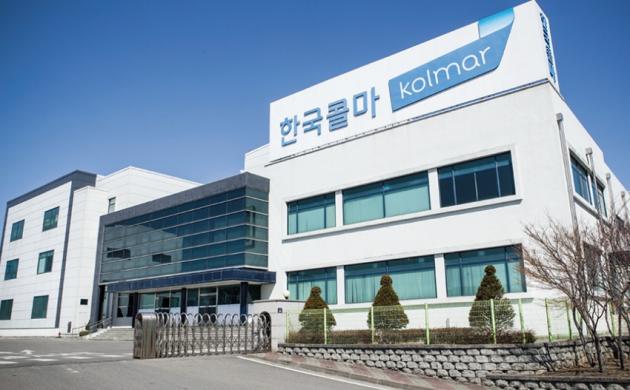Kolmar Korea is expected to transform into a pharmaceutical giant with annual sales reaching 1 trillion won ($930 million), as it recently signed a deal to take over CJ HealthCare.
CJ Cheiljedang, which owns the drugmaker in whole, said on Tuesday it signed the deal with Kolmar Korea to sell CJ HealthCare to the cosmetics manufacturer for 1.3 trillion won.
Kolmar Korea beat Hahn & Co., which offered a higher bid price at 1.4 trillion won, by promising that CJ HealthCare employees would keep their jobs, guaranteeing employees’ welfare at the current level, ensuring two-year independent management and three-year employment of executives.

With the acquisition of CJ HealthCare, Kolmar’s revenue ranking in the pharmaceutical industry will soar.
Last year, Kolmar Korea’s revenue was estimated to have reached 821.6 billion won. CJ HealthCare’s sales posted 536.8 billion won in 2017. The combined revenues of the two companies exceed 1 trillion won. Kolmar Korea’s sales from the pharmaceutical business amounted to more than 200 billion won last year.
As much as Kolmar is to grow in size, it faces many challenges, such as how to finance the money for the 1.3 trillion won buyout.
According to the audit report on Kolmar Korea, the company’s liquidity was in the red as of the third quarter having 25.9 billion won in cash and cash equivalents with borrowings at 100.5 billion won. At Kolmar Korea Holdings, short-term and long-term borrowings were also larger at 187.9 billion won than 71.9 billion won cash and cash equivalents.
Kolmar Korea has made efforts to reduce the risk of short cash. As it joined the CJ HealthCare auction, it formed a consortium with private equity funds – H&Q Korea, Mirae Asset Private Equity, and STIC Investments.
Although the company did not disclose the specific share ratio in the consortium, the three private equity firms are expected to finance half of the equity value (stakes, corporate rights, claims for equity, or corporate property), and Kolmar, the other half. Financial industry sources said Kolmar would take up about 300 billion won.
The due amount will likely be raised through acceptance financing by Korea Investment & Securities, news reports said. The brokerage participated in the CJ HealthCare sale, along with Hana Bank and Hana Financial Investment.
Analysts expressed mixed views on Kolmar’s latest takeover.
Seo Young-hwa, an analyst at SK Securities, said although Kolmar formed a consortium with private equity funds to acquire the drugmaker, it will be a significant financial burden for the company.
“It is likely that Kolmar will take the form of acquisition finance, just as FILA Korea did when it bought Acushnet,” Seo said.
If that’s the case with Kolmar Korea, it will have to pay a fixed interest to a private equity firm, and it will have to purchase a stake in the private equity firm every year or for a specified period,” he said. “It is obvious that this will elevate Kolmar’s status, but the company will also face a considerable amount of financial burden.”
However, NH Investment & Securities analyst Han Guk-hee forecast that Kolmar would raise up to 70 billion won from Korea Investment & Securities through acceptance finance and each of private equity firms would finance 100-200 billion won to cover the rest 600 billion won.
“The company’s funding burden will not be huge,” Han said. “I reckon the company will be able to raise the fund with the help of outsiders, without a capital increase. Kolmar Korea’s debt ratio is 50 percent, already generating 100 billion won EBITDA (earnings before interest, taxes, depreciation, and amortization) a year. The borrowing of 200 billion won is not excessive.”
Yoon Dong-han, founder, and chairman of Kolmar Korea, has been showing a strong commitment to acquiring CJ HealthCare.
Born in 1947 in Changnyeong, South Gyeongsang Province, Yoon graduated from Yeungnam University. After he entered Daewoong Pharmaceuticals in 1974, he built his career in the pharmaceutical industry. After working for Daewoong Pharm for 16 years, he became a vice president. In 1990, he left Daewoong and founded Kolmar Korea through a contract with Kolmar Japan.
Yoon initially focused on original equipment manufacturing (OEM) of cosmetic goods and later expanded the business into original design manufacturing (ODM). In February 2012, Kolmar Korea bought BRN Science (currently Kolmar Pharma) to enhance pharmaceutical business.
In the pharma sector, the company’s focus on OEM and ODM made Yoon to actively aspire to lead a comprehensive pharmaceutical firm by taking over CJ HealthCare.
“If Kolmar Korea’s CMO business integrates with CJ HealthCare’s prescription drug business and products for health and beauty industry, the company will leap forward into a comprehensive pharmaceutical company,” an official at Kolmar Korea said.
“The latest buyout was possible because Chairman Yoon and Kolmar Korea CEO Yoon Sang-hyun strongly pushed for the deal. Balancing the three areas – cosmetics, pharmaceuticals and healthy foods – will boost our global competitiveness,” the official went on to say.

